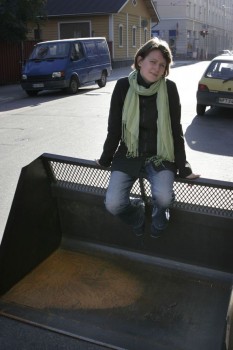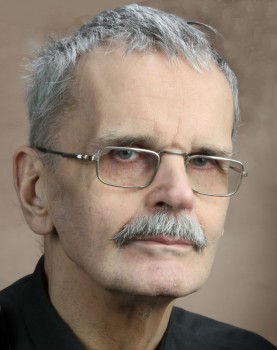Tag: poetry
Word-flames
1 March 2012 | Fiction, poetry
Harri Nordell breaks up grammar, invents words and leaves sentences unfinished. His poems are like minimalist, language-shattering sculptures of words. In her introduction Tarja Roinila compares Nordell’s poems to windows on to another world
Poems from Sanaliekki äänettömyydessä. Valitut runot 1980–2006 (‘Word-flame in silence. Selected poems 1980–2006’, WSOY, 2011)
You are beautiful
light-cupola-ecstasy of the eye
I look at you
from I-silence
daughter, bringer of the Word
involvement has been inscribed
with the name’s black reed
Girl, salt-grain of light
the mighty river of blood rinses memory,
otherness has come through us
![]()
Sound and meaning
20 January 2012 | Essays, Non-fiction
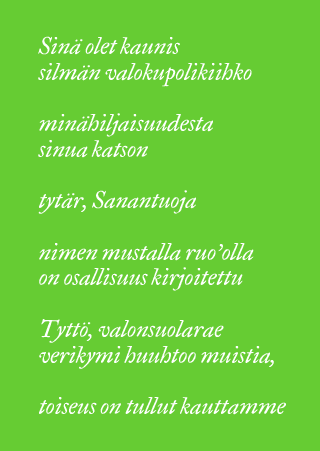
Harri Nordell’s poem from Huuto ja syntyvä puu (‘Scream and tree being born’, 1996)
Translating poetry is natural, claims Tarja Roinila; it is a continuation of writing it, for works of poetry are not finished, self-sufficient products. But is the translator the servant of the meaning – or of the letter?
I am sitting in a cafe in Mexico City, trying to explain in Spanish what valokupolikiihko, ‘light-cupola-ecstasy’, means. And silmän valokupolikiihko, ‘the light-cupola-ecstasy of the eye’.
I take to praising the boundless ability of the Finnish language to form compound words, to weld pieces together without finalising the relationships between them, never mind establishing a hierarchy: the eye is a light-cupola, the eye is ecstatic about light-cupolas, light creates cupolas, the cupola lets out the light, the eye, in its ecstasy, creates a light-cupola. More…
Leave and stay
19 December 2011 | Fiction, poetry
Butterflies, metamorphoses, burial and remembering are the recurrent images in Henriikka Tavi’s third collection, entitled Toivo (‘Hope’). Introduction by Mervi Kantokorpi
Poems from the collection Toivo (‘Hope’, Teos, 2011)
Mourning cloak
I will tell you, though you cannot hear it.
This is a story that you will come to forget.
I have gone, but there is no departure. And as
the meadow of absence begins to lapse into grief:
Do not grieve.
I was here a moment ago and
soon will be between the dermis and the epidermis.
I stand in a row behind myself; I am a memory of you.
Oh, you weak spark! You powerful
desire to turn into a fortune!
You were the crowd in my head.
I am serious, you only imagine me.
Don’t disappear. Leave and stay.
I’ll be no further than this. More…
A thankless task?
24 November 2011 | Letter from the Editors

Translator at work: St Jerome, translator of the Latin Bible in the late 4th century, is the patron saint of translators and librarians. Leonello Spada's 1610s painting, Galleria Nazionale d'Arte Antica, Rome. Picture: Wikimedia
Why translate, asked the late Herbert Lomas thirty years ago in an issue of Books from Finland (1/82) – the pay’s absurd, one’s own writing suffers from lack of time, it’s very hard to please people. And public demand for translation from minor languages into English was almost non-existent.
But he also admitted that translating is generally a pleasurable experience: ‘You have the pleasure of writing without the agony of primary invention. It’s like reading, only more so. It’s like writing, only less so.’ More…
High above the years
23 September 2011 | Fiction, poetry
In Gösta Ågren’s poetry austere aphorisms alternate with concrete observations of life in a small village that was and again is his home, and with portraits of people he has met on his journey in the world. Introduction by David McDuff
Poems from the collection I det stora hela (’On the whole’, Söderströms, 2011)
Father’s hands
(1945)
Father’s hands were like stiff
gloves; a furious
kettle had bewitched them
in his childhood. We ride
from the church’s tall letter
along the river’s long sentence
to the parenthesis of the bridal house,
and the thunder of three hundred hooves
fills the space beneath the clouds.
I saw father driving through
his life with those numbly
gripped reins, and later,
right now, I think of the
life-long body in which a man
comes, is wounded, and goes. More…
In memoriam Herbert Lomas 1924–2011
23 September 2011 | In the news
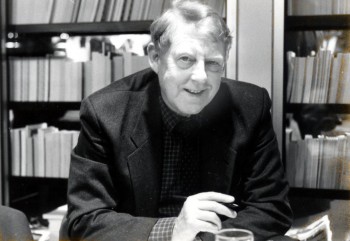
Herbert Lomas. Photo: Soila Lehtonen
Herbert Lomas, English poet, literary critic and translator of Finnish literature, died on 9 September, aged 87.
Born in the Yorkshire village of Todmorden, Bertie lived for the past thirty years in the small town of Aldeburgh by the North Sea in Suffolk. (Read an interview with him in Books from Finland, November 2009.)
After serving two years in India during the war, Bertie taught English first in Greece, then in Finland, where he settled for 13 years. His translations – as well as many by his American-born wife Mary Lomas (died 1986) – were published from as early as 1976 in Books from Finland.
Bertie’s first collection of poetry (of a total of ten) appeared in 1969. His Letters in the Dark (1986) was an Observer book of the year, and he was the recipient of several literary prizes. His collected poems, A Casual Knack of Living, appeared in 2009.
In England Bertie won the Poetry Society’s 1991 biennial translation award for one of his anthologies, Contemporary Finnish Poetry. The Finnish government recognised his work in making Finnish literature better known when it made him a Knight First Class of Order of the White Rose of Finland in 1987.
To Books from Finland, he made an invaluable contribution over almost 35 years – an incredibly long time in the existence of a small literary magazine. The number of Finnish authors and poets whose work he made available in English is countless: classics, young writers, novelists, poets, dramatists.
Bertie’s speciality was ‘difficult’ poets, whose challenge lay in their use of end-rhymes, special vocabulary, rhythm or metre. He loved music, so the sounds and tones of words, their musicality, were among the things that fascinated him. Kirsi Kunnas’ hilarious, limerick-inspired children’s rhymes were among his best translations – although actually nothing in them would make the reader think that the originals might not have been written in English. A sample: There once was a crane / whose life was led / as a uniped. / It dangled its head / and from time to time said:/ It would be a pain / if I looked like a crane. (From Tiitiäisen satupuu, ‘Tittytumpkin’s fairy tree’, 1956, published in Books from Finland 1/1979.)
Bertie also translated work by Eeva-Liisa Manner, Paavo Haavikko, Mirkka Rekola, Pentti Holappa, Ilpo Tiihonen, Aaro Hellaakoski and Juhani Aho among many, many others; for example, the prolific writer Arto Paasilinna’s best-known novel, Jäniksen vuosi / The Year of the Hare, appeared in his translation in 1995. Johanna Sinisalo’s unusually (in the Finnish context) non-realist troll novel Ennen päivänlaskua ei voi / Not Before Sundown, subsequently translated into many other languages, appeared in 2003. His last translation for Books from Finland was of new poems by Vilja-Tuulia Huotarinen in 2009.
It was always fun to talk with Bertie about translations, language(s), writers, books, and life in general. He himself said he was a schoolboy at heart – which is easy to believe. He was funny, witty, inventive, impulsive, sometimes impatient – and thoroughly trustworthy: he just knew how to find the precise word, tone of voice, figure of speech. He had perfect poetic pitch. As dedicated and incredibly versatile translators are really hard to find anywhere, we all realise our good fortune – both for Finnish literature and for ourselves – to have worked, and enjoyed with such enjoyment, with Bertie.
Poet Aaro Hellaakoski (1893–1956) was not a self-avowed follower of Zen, but his last poems, in particular, show surprisingly close contacts with the philosophy. ‘Secrets of existence are revealed once one ceases seeking them’, the literary scholar Tero Tähtinen wrote in an essay published alongside Bertie’s new Hellaakoski translations in (the printed) Books from Finland (2/2007). Bertie was fond of Hellaakoski, whose existential verses fascinated him; among his 2007 translations is The new song (from Vartiossa, ‘On guard’, 1941):
The new song |
Uusi laulu |
| No compulsion, not a sting. | Ei mitään pakota, ei polta. |
| My body doesn’t seem to be. | On ruumis niinkuin ei oisikaan. |
| As if a nightbird started to sing | Kuin alkais kaukovainioilta |
| its far shy carol from some tree – | yölintu arka lauluaan |
| as if from its dim chrysalis | kuin hyönteistoukka heräämässä |
| a little grub awoke to bliss – | ois kotelossaan himmeässä |
| or someone struck from off his shoulder | kuin hartioiltaan joku loisi |
| a miserable old bugaboo – | pois köyhän muodon entisen |
| and a weird flying creature | ja outo lentäväinen oisi |
| stretched a fragile wing and flew. | ja nostais siiven kevyen. |
| Ah limitless bright light: | Oi kimmellystä ilman pielen. |
| the gift of lyrical flight! | Oi rikkautta laulun kielen. |
Under the August moon
26 August 2011 | In the news
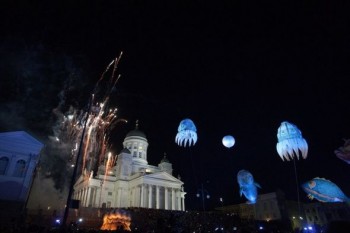
The Night of the Arts, 2009. Photo: Sasa Tkalcan
Helsinki becomes a busy cultural city in every August: Helsinki Festival, Stage Theatre Festival and Poetry Moon festival, for example, have a great variety of happenings on offer.
Also the seventh annual Helsinki Poetics Conference – an international and interdisciplinary conference for poets, writers and literary scholars – takes place on 27 and 28 August.
The organisers are the poetry organisation Nihil Interit (the publisher of the journal Tuli&Savu, ‘Fire&Smoke’) in collaboration with the Finnish Literary Research Society, and it is a part of the Runokuu / Poetry Moon international poetry festival.
And The Night of the Arts, of Helsinki Festival, takes over the city – for the 23rd time, tonight.
Poetry written aloud
20 May 2011 | Reviews
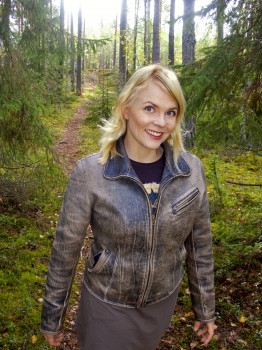
Heli Laaksonen. Photo: Otava/Irmeli Jung
In the 21st century, poetry written in various dialects has drawn new audiences to poetry readings. A common feature of, for example, Sinikka Nopola’s short prose about the family, written in the dialect of the Tampere area, and Heli Laaksonen’s poetry, which is written in the dialect of south-west Finland, is the enormous popularity of live performances by the authors. Their audiences love to hear them read in dialect, because the texts are funny, and they sound even funnier when read aloud.
Heli Laaksonen (born 1972) has, ever since her first collection, Pulu uis (‘Pigeon swimming’, 2000), been Finland’s best-selling poet. Her three collections and audio books have achieved sales figures that are astonishing in the Finnish context – tens of thousands of copies. Her fourth collection, Peippo vei (‘The chaffinch took it’, Otava, 2011), has been at the head of bookseller’s sales lists throughout March and April. More…
A soul on the train
In one of Heli Laaksonen’s poems the narrator buys a ticket for her soul and herself in a train’s pet carriage. Her capricious poetry features new potatoes, woodpeckers, weasels, and even a pig in fox’s clothing. Introduction by Mervi Kantokorpi
Poems from Peippo vei (‘The chaffinch took it’, Otava, 2011)
First early
From the potato patch there rose a human seedling, too.
Winston, I called it
as it was Winstons I’d sowed in this row
Whole,
beautiful,
unmarked by hoe or blight.
I put it in the basket with the others.
It sat there in the quiet pile, at the edge,
looked on while I slogged away,
gnawing a little bit out of the side of a potato.
What was it thinking?
What could it be that earlies think about?
The first summer sparrows are fresh out of the oven.
I so wish they’d only think about nice things.
I try to look happy
to give them a good start. More…
Coolness and warmth
21 April 2011 | Reviews

Bo Carpelan. Photo: Irmeli Jung
The coolness on the mountain
streams of water, black forests
in the west a growing light
foreboding sleep
These lines are from Gramina, the twenty-second and last collection of verse by the Finland-Swedish poet Bo Carpelan, which appeared last summer.
The short poem captures much of what was typical of Carpelan’s poetic style: a visually sharp and objective image which juxtaposes the world we see with a sense of something different, undefined. Time the unstoppable, which changes everything, was his central theme, and it also figures here.
Carpelan (1926–2011) made his debut in 1946 and was hailed early on as a renewer of the modernist tradition that in Finland began in the early 20th century with Edith Södergran (1892–1923) and Elmer Diktonius (1896–1961). He combined the Finnish-Swedish heritage of reflective nature poetry with imagistic stimuli from Swedish- and English-language modernism. More…
Scent of greenness
21 April 2011 | Fiction, poetry
‘Time the unstoppable’ features in the last collection of poems, Gramina, by Bo Carpelan (1926–2011), who reads timeless poetry while writing his own verses. In his introduction, Michel Ekman quotes the American poet and philosopher Ralph Waldo Emerson, who thought books should stimulate the reader’s thoughts instead of merely being devoured
Poems from the collection Gramina. Marginalia till Horatius, Vergilius och Dante (‘Gramina. Marginalia to Horace, Virgil and Dante’, Schildts, 2011)
Surf on the net –
in the net you are
with mouse and waiting spider
![]()
Fills life’s piggy bank
until it is emptied
![]()
The paved road of envy
where you stumble
![]()
Be sufficient unto oneself?
And who is this ‘self’
who doesn’t introduce himself? More…
In the mirror
5 April 2011 | Reviews
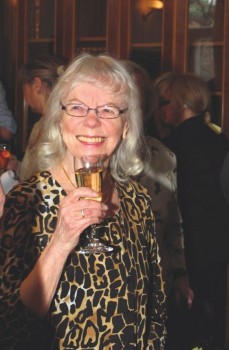
Aila Meriluoto. Photo: Tiina Pyrylä/WSOY
One of the more attractive aspects of Finnish literature is the juxtaposition of poetry-writing generations. 2011 sees the debut of both the 82-year-old Martta Rossi and new poets born in the 1980s.
Compared to them, the 87-year-old Aila Meriluoto is an old hand: Tämä täyteys, tämä paino (‘This fullness, this weight’, WSOY, 2011) is her 14th volume of poetry.
Since her first collection, which appeared 65 years ago, the grande dame has published more than 20 works: poetry, prose, diaries, books for children and young people, biographies and translations, among them poetry by Harry Martinson and Rainer Maria Rilke. More…
Suddenly here, fully present
5 April 2011 | Fiction, poetry
The women in mirrors who recur in the work of Aila Meriluoto (born 1924) are poetic figures who have featured in her poetry since her first collection, published in 1946. In these new poems, from Tämä täyteys, tämä paino (‘This fullness, this weight’), she also describes women who are ‘alive to the brim’ or ‘extreme ballerinas’. Introduction by Mervi Kantokorpi
We live in strange times
my skull full of echoes.
The rose has throbbed
the heart flowered.
In the mirror a girl on her head,
from the wall steps an old woman,
all of them familiar,
none remembered.
Suddenly here.
Fully present.
Eighty-five years.
Hands wrinkled, shaky legs.
And alive to the brim.
And over. Dripping.
Surging. More…

